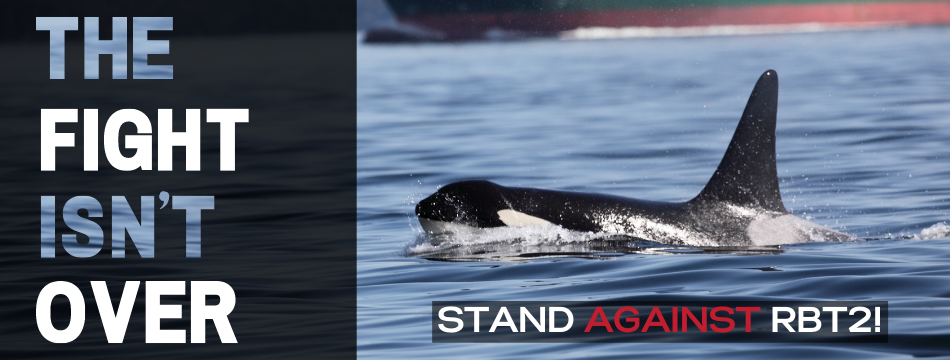
Image: Miles Ritter
In June we celebrated Orca Action Month and in the last couple of weeks we got some good news for the Southern Resident orca population and we wanted to share our excitement with you!
There are two new calves in Lpod!
On Friday, June 30, the Centre for Whale Research confirmed that there are two new calves in the endangered Southern Resident orca population. The calves are L126, whose mom is L119 and L127, whose mom is L94 and they both seem to be around 2 months of age and healthy!
These calves are the first ones to be born in Lpod since 2021. And they are already bringing so much hope for the recovery of their pod and the entire population because let’s remember that in last year’s census, Lpod was reported to have been in its lowest numbers since 1976, with only 32 orcas.
L126 is also L119’s (Joy) first calf and she is only 11 years old, which means she is just at the beginning of her breeding life and can have a big impact on the recovery of this endangered population over the next 30 or so years while she is a breeding female.
Although we are cautiously optimistic because of the high mortality risk these orcas face in their first year of life, there is no doubt that these births are a ray of hope.
Fortunately, the baby news doesn’t end there. Remember J59, the newest member of Jpod that was born last year? Well, back in March she celebrated her first birthday – and through Orca Conservacy’s Instagram page, we learned that on June 25, she was gifted her name!
In a traditional potlatch naming ceremony, the Samish Indian Nation announced J59’s name: Sxwyeqólh (Swee-a-kosh), which means “Reason for Hope Child”.
This marks Sxwyeqólh’s biggest milestone yet and indeed, another reason for hope!
There is still so much work ahead of us to help recover and protect this important population and we want to thank you for your continued support for our work.
Help us ensure L126 and L127 live long and healthy lives!
Unfortunately, it’s never just good news when fighting to protect an endangered species and one of the worst pieces of news we got this year was the federal approval of the Roberts Bank Terminal 2 expansion project back in April.
If constructed, the project will destroy 177 hectares of highly biodiverse area that supports more than 100 already at-risk species, including the Southern Resident orcas and wild Pacific salmon.
Since this will be a fully automated terminal, the project is also threatening the jobs of more than three thousand longshore workers in BC and possibly more around North America. In the words of Rob Ashton, president of the International Longshore and Warehouse Union of Canada (ILWU) “When one terminal goes automated, the rest follow suit”.
Fortunately though, the fight is not over yet, the project also needs provincial approval and right now, we need your help to demand that BC stops this terrifying project.
It’s time to stop RBT2!
There is no justification for this project, we need to protect the Salish Sea and we need to protect local jobs now. This is why we teamed up with more than 10 organizations, including the Wilderness Committee, Birds Canada, the BC General Employees’ Union (BCGEU) and the ILWU to try to stop this project once and for all.
Read the press release here and catch us up on CTV News saying NO to RBT2!
And more actions you can do to help orcas!
Are you planning to explore the Salish Sea this summer? If the answer is yes, then you need to make sure you are being Whale Wise while doing so!
As of June 1st, 2023, there are many active protection measures in place in BC’s coastal waters to protect the endangered Southern Resident orcas and every user in the water needs to know. These include:
- Staying 400m away from any orcas in Southern BC coastal waters between Campbell River and just north of Ucluelet,
- Avoiding interim sanctuary zones where human power vessels are not permitted,
- Abiding by speed restriction zones in Swiftures Bank.
Learn the Regulations!
*Please note that these restrictions apply to all human-powered vessels, including kayaks, paddle boards, etc.
Going the extra mile!
Recently, the Washington Department of Fish and Wildlife designated 11 Southern Resident orcas as vulnerable and declared an emergency rule requiring commercial whale-watching operators to stay at least 926m from the vulnerable whales. These whales have been deemed vulnerable due to poor body condition and at least one late-stage pregnancy.
While this ruling only applies to US waters and commercial whale-watching operators, we encourage everyone to give extra space to Southern Resident orcas, and if unable to identify them, to any orcas you see swimming around.
The recovery of this species is in everyone’s hands, paddles, and motors!
Help us protect L126, L127 and their entire population by supporting our work today!
Fighting disastrous projects like Roberts Bank Terminal 2 and advocating for better regulations and on-the-water enforcement for Southern Resident orcas is only possible through the contributions of our supporters and donors.
This year, we are going to court to try to stop RBT2 while at the same time continuing to educate the public and lobbying the government for better protection measures. Your donation will ensure we are able to continue this fight and secure a healthy future for L126 and L127 and future calves.
Keep yourself informed
Did you find the information in this blog interesting? If yes, then make sure you sign up for our Orca Action Team Newsletter where you would get this and more information all about orcas, before anyone else. It is a whale of a time to be part of this community!



